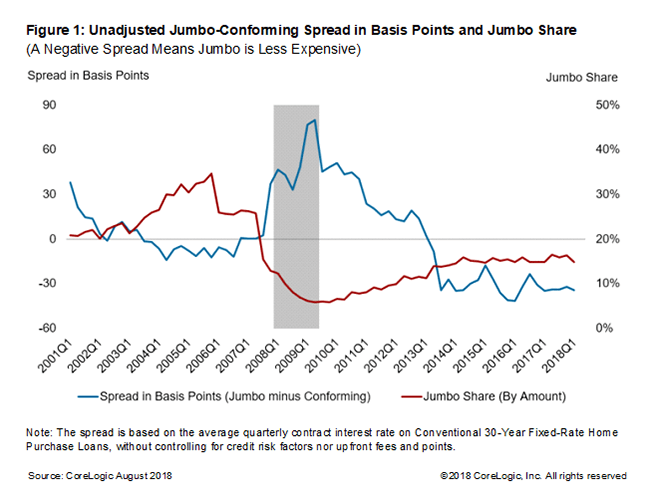Jumbo Loan: Unlock the Door to Luxury Dealing With Specialized Home Mortgage Options
Navigating the Jumbo Finance Landscape: Vital Insights for First-Time Homebuyers
Browsing the intricacies of jumbo fundings provides an unique collection of obstacles for first-time property buyers, specifically in a developing real estate market. Understanding the necessary qualification requirements and potential advantages, along with the disadvantages, is essential for making educated decisions. Additionally, establishing a solid financial method can dramatically improve your potential customers.
Comprehending Jumbo Fundings

Due to the fact that jumbo fundings are not backed by government-sponsored entities, they bring various underwriting standards and need even more comprehensive monetary documents. This difference can result in higher passion rates contrasted to standard finances, offered the increased risk to loan providers. Big financings likewise use distinct advantages, such as the capability to fund higher-value residential properties and potentially a lot more adaptable terms.
First-time property buyers ought to additionally be mindful that protecting a jumbo loan typically demands a larger down settlement, typically ranging from 10% to 20%. Additionally, debtors are normally expected to demonstrate solid creditworthiness and a secure revenue to qualify. When discovering big finance options in their search of homeownership., understanding these subtleties can equip newbie property buyers to make educated choices.
Eligibility Demands
Protecting a jumbo lending needs conference particular eligibility needs that differ substantially from those of standard lendings. Unlike traditional lendings, which are often backed by government-sponsored entities, big fundings are not insured or ensured, causing stricter criteria.
Furthermore, borrowers should demonstrate a robust economic profile, which includes a reduced debt-to-income (DTI) proportion, usually no higher than 43%. This makes certain that customers can handle their month-to-month payments along with other monetary obligations.
Moreover, many loan providers call for significant documents, including proof of revenue, asset declarations, and income tax return for the previous 2 years. A considerable deposit is additionally essential; while conventional car loans might allow down repayments as low as 3%, big lendings commonly require at the very least 20%, depending on the financing and the loan provider quantity.
:max_bytes(150000):strip_icc()/dotdash_Final_Jumbo_Loan_May_2020-01-d552693b65b74099bf1c6cd4d300cc5a.jpg)
Benefits of Jumbo Fundings
For lots of new property buyers, big lendings supply distinctive benefits that can promote the journey toward homeownership. Among the primary benefits is the capacity to fund homes that exceed the adjusting loan limitations set by government-sponsored entities. This flexibility enables customers to access a broader array of high-value properties in affordable genuine estate markets.
In addition, big car loans commonly feature eye-catching rate of interest prices that can be less than those of conventional financings, particularly for borrowers with strong debt profiles. This can lead to considerable financial savings over the life of the car loan, making homeownership extra affordable. Big loans usually allow for higher loan amounts without the demand for exclusive home why not look here mortgage insurance (PMI), which can even more minimize regular monthly repayments and total costs.

Prospective Downsides
Many prospective property buyers might find that big car loans come with substantial disadvantages that warrant mindful factor to consider. One of the primary concerns is the rigorous qualification requirements. Unlike adhering lendings, jumbo lendings normally require higher credit rating, usually exceeding 700, and substantial income paperwork, making them much less easily accessible for some customers.
In addition, jumbo loans typically come with higher rate of interest compared to standard lendings, which can result in increased month-to-month repayments and total loaning costs. This premium might be particularly troublesome for novice homebuyers who are already browsing the economic intricacies of buying a home.
One more significant disadvantage is the bigger down payment need. Lots of loan providers expect a minimum down settlement of 20% or more, which can position an obstacle for purchasers with minimal financial savings. The absence of government support for big finances leads to much less positive terms and problems, enhancing the danger for lending institutions and, as a result, the borrowing expenses for property owners.
Finally, market fluctuations can substantially affect the resale value of high-end homes financed with jumbo financings, including an element of economic changability that novice property buyers may discover challenging.
Tips for First-Time Homebuyers
Browsing the complexities of the homebuying process can be frustrating for newbie purchasers, specifically when taking into consideration jumbo lendings (jumbo loan). To simplify this journey, sticking to some vital strategies can make a considerable distinction
First, enlighten yourself on jumbo fundings and their particular needs. Understand the various loaning criteria, consisting of credit rating, debt-to-income proportions, and down payment expectations. Typically, a minimal credit report of 700 and a deposit of a minimum of 20% are essential for approval.
2nd, involve with an experienced mortgage specialist. They can give insights customized to your economic scenario and assist you browse the details of the jumbo loan landscape.
Third, consider pre-approval to reinforce your purchasing placement. A pre-approval letter signals to sellers that you are a severe purchaser, which can be helpful in open markets.
Lastly, do not ignore the importance of budgeting. Element in all prices connected with homeownership, consisting of building taxes, upkeep, and house owners' insurance. By following these ideas, new purchasers can come close to the jumbo finance original site process with better self-confidence and clarity, improving their chances of successful homeownership.
Final Thought
To conclude, navigating the big finance landscape requires a detailed understanding of qualification criteria, benefits, and possible downsides. New buyers can enhance their possibilities of success by find this preserving a strong credit history score, managing their debt-to-income ratio, and planning for larger deposits. Involving with knowledgeable home mortgage experts and acquiring pre-approval can better reinforce settings in competitive markets. Eventually, detailed prep work and education pertaining to jumbo fundings can bring about more enlightened decision-making in the homebuying process.
When navigating the intricacies of the housing market, understanding big loans is vital for new property buyers intending for properties that go beyond standard funding restrictions. Big financings are non-conforming fundings that generally surpass the adhering finance limit established by the Federal Real Estate Money Company (FHFA)Additionally, jumbo fundings commonly come with appealing interest rates that can be reduced than those of traditional fundings, particularly for borrowers with strong credit history accounts. Jumbo financings typically enable for higher lending amounts without the need for private home mortgage insurance (PMI), which can better reduce regular monthly repayments and total prices.
Unlike adapting fundings, big fundings generally call for higher credit ratings, usually exceeding 700, and considerable income documentation, making them much less easily accessible for some debtors.